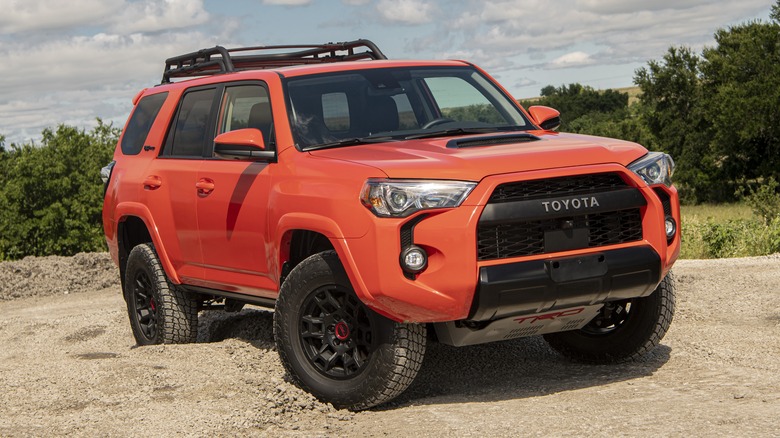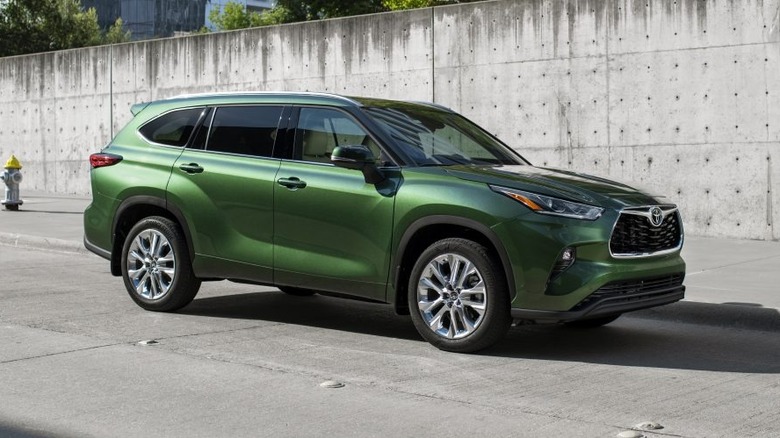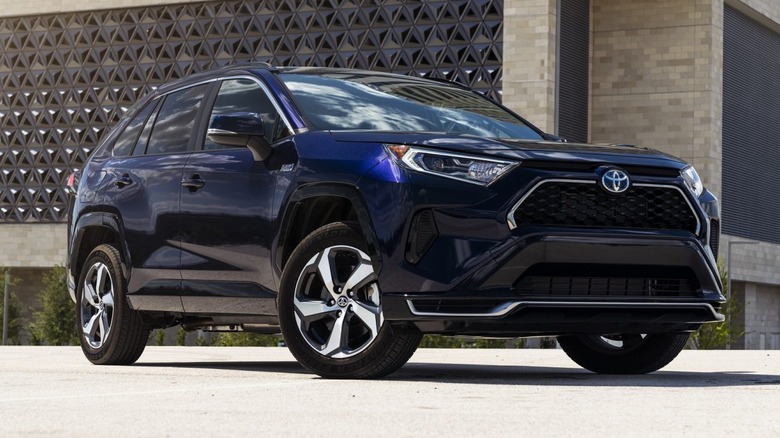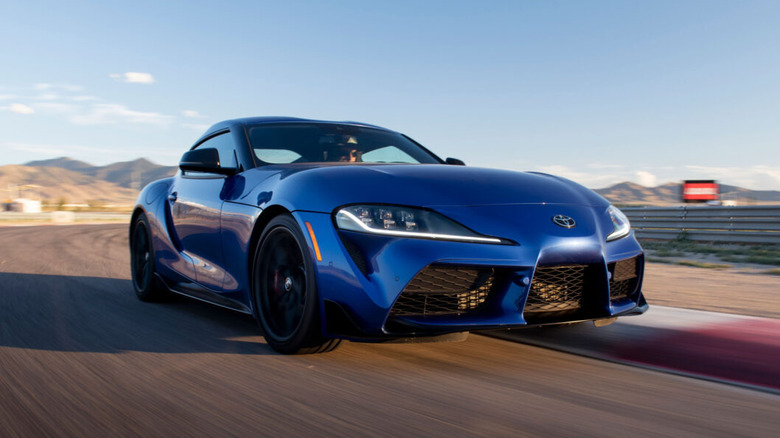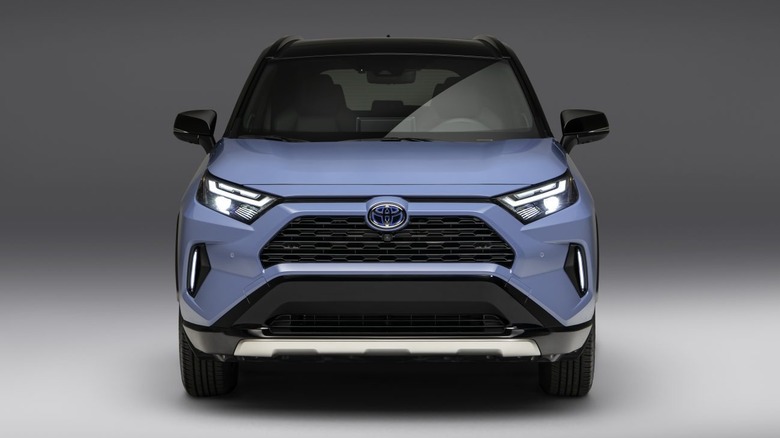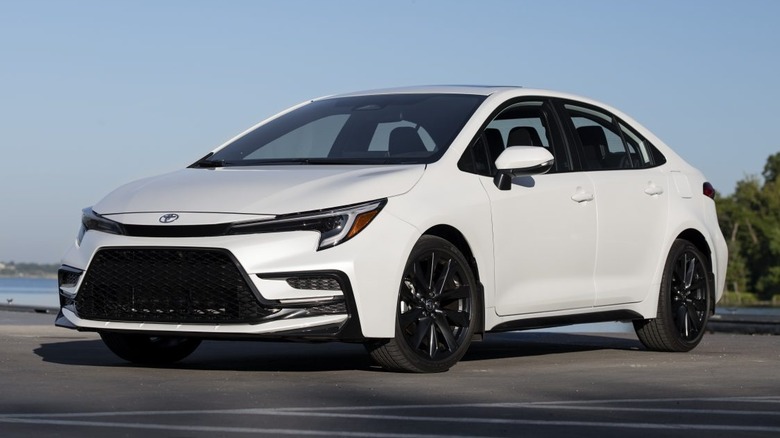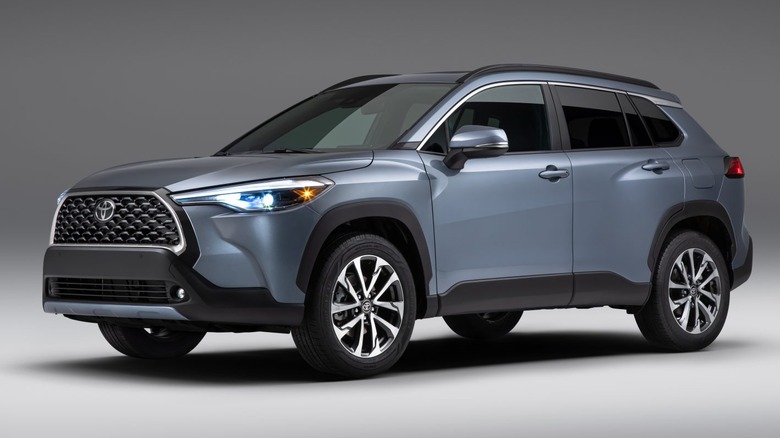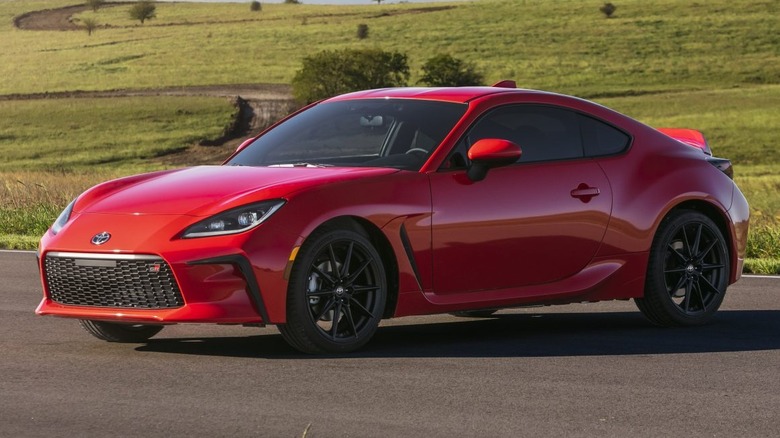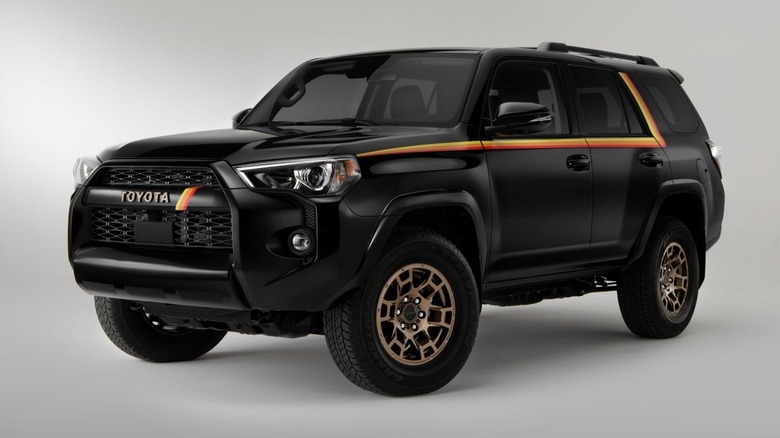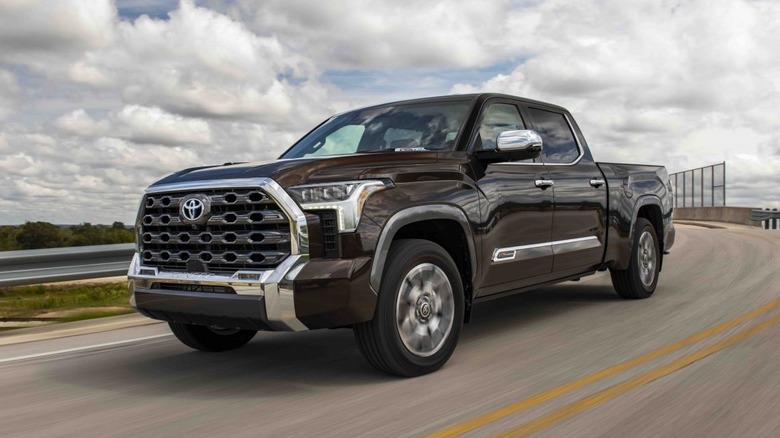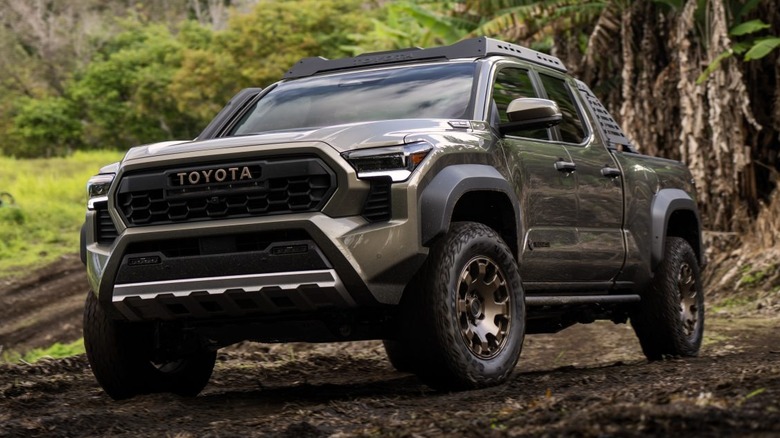10 Toyota Models With Outstanding Resale Value
After the used car market saw record price highs in 2022, things have, thankfully, started to calm down a little. The supply squeeze caused by the global semiconductor shortage is easing, and the effects of the pandemic stimulus cash are subsiding. However, things are far from rosy for many new car buyers — as millions are affected by a rise in living costs, extracting the most value from a new car purchase has become more important than ever. Toyota was recently named as the best overall brand for strong resale value, with many of its bestselling models outperforming the market average by a significant margin.
We've compiled data from the resale and research platform iSeeCars to draw up a list of Toyota's top best-performing models, measured in terms of their retained value after five years of ownership. It's worth noting that many car-specific factors can have a significant impact on resale value, with everything from mileage and condition to car color affecting the end value. However, these Toyotas are among the safest bets on the market.
Toyota Highlander – 61.9%
The 2023 model year Toyota Highlander doesn't do much to rock the boat, but that's no bad thing — it didn't become a bestselling family hauler by constantly reinventing itself. It's a familiar affair that anyone who's previously driven a Toyota SUV should feel instantly at home in, but there are a few new tech features available in the latest version. Those include the 360-degree camera with an overhead view that shows you what's under the car, and a refreshed UI for the central touchscreen display.
The Highlander's status as a longstanding family favorite seems to have had a positive impact on its depreciation, with the expected five-year resale value of the non-hybrid Highlander sitting at 61.9% of the original purchase price. However, the Highlander Hybrid is expected to perform notably worse, with a resale estimate of 56.9% after five years, putting it closer in line with many comparably priced three-row rivals.
Toyota RAV4 Prime – 62.0%
Toyota's plug-in hybrid version of the RAV4 doesn't quite hold its value as well as its gas-only counterpart, but it's still one of the best in class. SlashGear drove the car at the launch of the current generation and found it to be just as appealing as a standard RAV4, with the bonus of more than 40 miles of all-electric range. Its driving dynamics are average for its size, and let's face it, there are more exciting SUVs on the market, but for no-frills A-to-B driving, the RAV4 Prime does exactly what you want it to.
The average retained value for the car after five years stands at exactly 62%. Despite Toyota essentially creating the hybrid segment with the launch of the original Prius, values for the brand's hybrid cars are generally a little less resilient than plain gas-powered versions. Perhaps this is due to the largely unfounded belief that hybrids cost more to maintain than non-hybrids, or uncertainty over the future state of electric charging infrastructure. Either way, it's something to keep in mind when deciding whether an electrified or purely fossil-fueled powertrain is the right choice for your next car.
Toyota GR Supra – 63.5%
It's not just SUVs and family haulers that benefit from Toyota's strong average resale values — the automaker's halo sports car also holds its value well. It's estimated to retain 63.5% of its value over five years, an impressive figure considering the rapidly evolving nature of the sports car market at present. Its appeal comes down to its clever mix of performance and versatility, since it packs enough grunt to make it fun on the track but also remains comfortable doing daily driver duties.
It's impossible to write about the latest Supra and not acknowledge its BMW underpinnings, but especially in manual guise, it feels like a car designed primarily to appease JDM fans rather than Euro enthusiasts. There are plenty of cars that will beat it in a straight line, and depending on personal tastes, will be easier on the eye, too. However, few of those rivals can expect to deliver owners so much of their initial investment back after a few years of ownership. Perhaps the one exception to that rule is the Porsche 718 Cayman, which beats even the Supra to deliver an exceptional five-year retained value of 78.3%.
Toyota RAV4 – 65.3%
The non-hybrid RAV4 is one of the best performers in its segment for retained value, keeping 65.3% of its original purchase value over the half-decade measurement period. According to some estimates, it's also the world's bestselling car overall, with over 1,000,000 examples delivered last year. So what exactly makes it such a winning formula? Well, its solid reliability ratings surely help its appeal, alongside its competitive standard tech and spacious interior.
Toyota's reluctance to mess with the formula also makes the RAV4 a more familiar car to returning buyers, as opposed to rivals from the likes of Kia and Hyundai that have undergone drastic design changes in recent years. The range of tried-and-tested powertrains on offer also delivers the right mix of power and efficiency, and at a starting price under $30,000, the car remains within reach even for buyers on tighter budgets. In short, it ticks all the right boxes for buyers looking for hassle-free car ownership, which is probably why it continues to hold its value well even when some of its rivals see much more significant depreciation.
Toyota Corolla – 67.2%
The cheapest car in Toyota's current lineup is the Corolla sedan, which starts at $21,700 for 2023. Such affordability means the Corolla misses out on the premium finishes and extra tech included with the brand's pricier models, but most importantly, its excellent value for money remains unchanged. For any buyer on a tighter budget, reliability is key, and the Corolla doesn't disappoint. Consumer Reports rates the 2023 model as "much more reliable" than the industry average, meaning less time spent in the garage and less money spent for owners.
Owners also save money when it's time to resell, as the Corolla is estimated to retain 67.2% of its initial value after five years have passed. Considering the asking price for a base-spec Corolla is so low, that means buyers can expect to lose less than $1,700 per year on average in depreciation over the five-year period. Although also a strong performer, the hatchback variant of the Corolla loses a little more over the same time frame — resale values are expected to be 63.8% of the purchase price.
Toyota Corolla Cross – 68.6%
Similarly affordable to the sedan Corolla is its crossover sibling, the Corolla Cross. It's marginally pricier than its counterpart, with a starting MSRP of $23,610 for 2023, but it's still very much at the cheapest end of the market. As such, it forgoes many of the extras that other Toyota crossovers enjoy, but in terms of numbers, it's difficult to beat. It offers 169 horsepower in base-spec form, giving it more than enough grunt for everyday driving, and its efficiency figures are largely on par with what else is in the segment.
It sports the same strong reliability ratings as the Japanese automaker's other offerings and a decent warranty package with two years of complimentary maintenance. Adding to its appeal is its very strong value retention, which is estimated to be 68.6% over five years. Few crossovers offer such a low starting price, and even fewer can claim to hold their value so well.
Toyota GR86 – 75.3%
The second generation of Toyota's affordable sports car was introduced for the 2022 model year, and demand for the car quickly proved to be very strong. It's easy to see why. With a larger, more powerful engine than its predecessor and a few chassis tweaks for improved handling, the GR86 is now an even more compelling alternative to the segment benchmark, the Mazda MX-5 Miata. It's produced alongside its badge-engineered sibling, the Subaru BRZ, with both cars delivering maximum bang for the buck at a price that's temptingly affordable for many enthusiasts.
The high demand for the second-generation car has seen its estimated five-year value skyrocket, with a predicted 75.3% retention of the original purchase value. The GR86 even fares better than the 2023 BRZ, which carries an estimated 71.9% of its original value after five years. That makes what was already a compelling car even more of a bargain. Incidentally, it also makes the GR86 Toyota's best-performing passenger car in terms of depreciation, with only select trucks and SUVs beating it.
Toyota 4Runner – 75.3%
The 2023 Toyota 4Runner might not be the newest vehicle in its segment, nor the best to drive on the road. However, its status as a trail-ready off-roader has kept it popular long after many of its rivals have been upgraded, with the current generation of the SUV now in production for an impressive 14 years. Toyota released a special edition 40th Anniversary package to celebrate four decades of 4Runner production, but it remains to be seen what effect this special edition has on the car's resale price. Not that buyers of the regular 4Runner should be worried: at a five-year value retention rate of 75.3%, the veteran SUV is already among the best on the market.
Its body-on-frame construction makes it a rare breed as many rivals switch to unibody construction, chasing better road handling and improved efficiency figures. The 4Runner makes no such concessions, and as a result, it still retains that bulletproof, tried-and-tested feel that continues to make it a bestseller. On paper, it might be outclassed by most of its rivals, but its strong resale price reflects the fact that, in its all-terrain capabilities, few can match it.
Toyota Tundra – 80.5%
After being treated to a major refresh for the 2022 model year, the Tundra is back and able to properly compete with the big players once again. It's available in a large range of trims, with the most basic starting at a fraction under $40,000 and the most lavish costing around double that figure. In theory, that should make resale values a mixed bag, but it seems that values remain rock solid no matter what trim buyers opt for. Average resale value after five years sits at 80.5% of the purchase price, making this one of the best-performing vehicles on the market, period.
If that wasn't impressive enough, the Tundra also boasts solid reliability ratings and a smattering of new tech additions, bringing it in line with the best of Toyota's passenger car lineup. To say the competition is fierce would be an understatement, especially with Ford launching a sought-after electric version of its segment-dominating F150 pickup in 2022. The resale value for the F-150 Lightning isn't available yet, but it's very unlikely to even get close to the segment-leading value retention of the Tundra.
Toyota Tacoma – 86.2%
The Tundra might be leading the pack for value in the full-size pickup segment, but its smaller brother the Tacoma is doing even better in the mid-size segment. The redesigned 2024 model is on sale now, boasting a host of improvements over the previous generation. A wider range of trims than ever is on offer, catering to everyone from budget-conscious buyers to those looking for a luxurious alternative to the top-spec offerings from Ford and Chevy.
The truck is expected to keep 86.2% of its value after a five-year period, a figure that would have been almost unheard of for a truck even just a few years ago. Keep in mind that this is only an average estimate — higher mileage or rougher condition trucks won't necessarily achieve such high resale prices. Nonetheless, it makes the Tacoma perhaps the strongest value of all in its segment, not to mention strongly competitive in almost every other aspect thanks to the slew of upgrades arriving for 2024.
